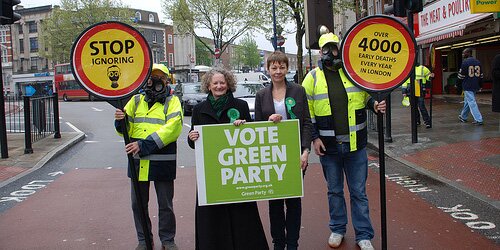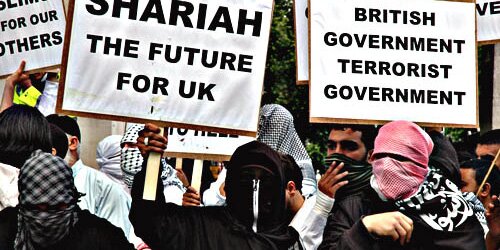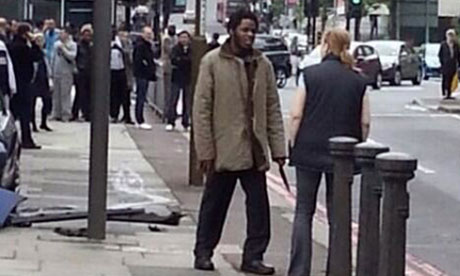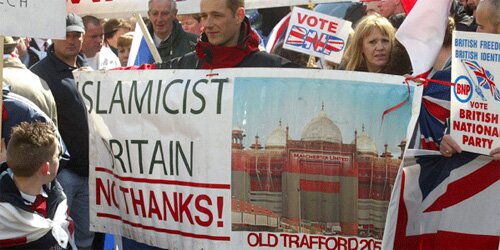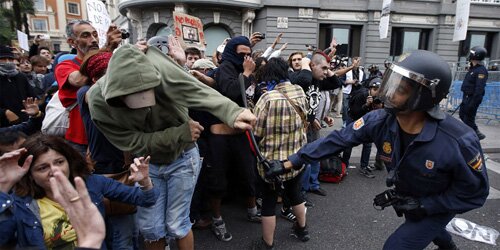Who’s to blame for the accidental death?
10:28 am - April 10th 2009
| Tweet | Share on Tumblr |

Both Shuggy and Chris Dillow are right in pointing out that the police treatment of Ian Tomlinson was far from shocking, as some others have claimed.
If anything, the officer who violently pushed him over when there was no need whatsoever to do so was taking part in some of the less dangerous action with the protesters that day. As long as Tomlinson didn’t hit his head, and from the video it seems that he didn’t, a push like that is only likely to result in grazed or cut knees and hands, along with the temporary shock that comes from being bundled over when you’re not expecting it. The cracking of heads which other officers were engaged in all day, causes far more potential for concern.
The entire slow emergence of what actually happened as opposed to the police version of events is also not shocking; rather wholly predictable, following the same pattern as that of earlier events where the police have been involved in inflicting either serious injuries or even death on completely innocent bystanders. The first obvious example is Jean Charles de Menezes, where the misinformation if not outright lies which emerged from the Metropolitan police before leaks from the Independent Police Complaints Commission inquiry established that much of their story was entirely false.
Confusion and different accounts of what happened are always likely to be the order of the day to begin with, and we should expect that over time that the story will change.
Perhaps even more instructive though as to how far the police will go in denying their involvement in occasionally brutal tactics is the treatment that was meted out to Babar Ahmed when he was arrested. Medical examination showed quite clearly that he had been seriously assaulted despite putting up no resistance, but the Met completely denied any wrongdoing, right up until six years later in the High Court when the commissioner had to shamefacedly admit what had happened so that the officers themselves did not have to give evidence. Perhaps unsurprisingly, the officers involved had a cache of complaints made against them, overwhelmingly from Asian and black men, the letters of which had mysteriously gone missing. None of the officers involved appears to have been disciplined.
Nice as it would be to establish a complete pattern, it still doesn’t entirely fit.
For while the policing at last Wednesday’s protest was almost inevitable after the police and media repeatedly hyped up the idea there would be violence, at other demonstrations it has been a different story, possibly because of the short notice the police have had of them rather than actual tactical differences.
The Gaza protests in January for example were for the most part poorly policed, as well as poorly organised, as clearly no one had expected the numbers which turned up, and the disorder which happened could have been nipped in the bud if the police had stepped in sooner to arrest the troublemakers, for which they would have had overwhelming support to do.
At the continuing Tamil protests in central London, the police yesterday foolishly rushed in to confiscate flags which they claimed were emblems of the Tamil Tigers, a proscribed terrorist organisation, when they were instead the normal Tamil flag. On the Gaza protests, the flags of Hizbullah, Hamas and some even claimed al-Qaida were swung, draped over backs and flown with no such intervention from the police. The lack of consistency is striking, and it has to be assumed that the police do what they do when they can get away with it and when they can’t they fall back. Tamils it seems are easier targets than potentially hot head young Muslims.
Once you have stripped everything away, the responsibility for the policing of the protests does not however fall on the heads of the cops themselves: it rests with the state, or the government, itself. The practice of kettling, of riot police attacking protesters who were either sitting down or involved in the entirely peaceful Bishopgate climate camp is not just down to the police hierarchy but to the politicians who authorise or even encourage such tactics.
As Shatterface pointed out last week, during the 80s the left routinely referred to the police as Thatcher’s shock or storm troopers. That applies just as much today if not more so, except now they’re New Labour’s first line of defence. Can the casual deprivation of liberties and the right to protest, such as the continuing ban on demonstrations within a mile of parliament really be separated from the actions of the police last Wednesday and across the country over the last few years?
Last Wednesday was just the most visible demonstration of the contempt for the right to protest which has continued to develop. Those watching the scenes, whether of the lone band of idiots who smashed up the RBS branch or of those bleeding from their heads after accidentally coming into contact with police batons will have only taken one message from such pictures: that registering your anger in such a way is wrong, and that if you continue to do so regardless of that fact, then you’ve only got yourself to blame if you’re left with a few bruises.
The one very weak bright spot to take from the emergence of the video showing what happened to Tomlinson is that it has fatally undermined the supposed ban on taking photographs and video of police officers. No one can now argue that such measures are necessary when without such material the truth would have never been exposed.
More
Jim Jay – More evidence: police obstructed Tomlinson’s ambulance
LibdemVoice – Police change their tune on G20 CCTV coverage
Harpymarx – G20 death: cop suspended
| Tweet | Share on Tumblr |  |
'Septicisle' is a regular contributor to Liberal Conspiracy. He mostly blogs, poorly, over at Septicisle.info on politics and general media mendacity.
· Other posts by Septicisle
Story Filed Under: Blog ,Civil liberties ,Crime ,Our democracy
Sorry, the comment form is closed at this time.
Reader comments
Re: the last paragraph.
On the contrary. I think the police will use this death as an argument as to why there should an explicit specific crime of photographing a police officer in the course of their duty. And I expect Smith to cave in to them.
Mike Killingworth,
That would be the worst possible outcome.
There was and is no general prohibition on taking pictures or video of police officers on duty. It was only ever a phantom produced by some of the more extreme civil liberties campaigners who felt like they needed a popular campaign against an unjustified restriction, and so conjured just such an unjustified restriction out of thin air.
David Boothroyd,
The last link in the editorial here:
the supposed ban on taking photographs
seems to me, at least, to challenge what you have just said. Or is at a specific prohibition at the discretion of someone or other? I think we should be told.
The claim was that section 76 of the Counter-Terrorism Act 2008 automatically encompassed a ban on taking any photograph of a police officer on duty. Read the section here. That claim would mean asserting that any photograph of a police officer, even a tourist in Trafalgar Square having their picture taken with a passing bobby, constitutes information “which is of a kind likely to be useful to a person committing or preparing an act of terrorism”.
It’s ludicrous, it always was ludicrous, and those who put out this claim knew it was ludicrous.
OOO-WOOGAH-OOO-WOOGAH – Straw man alert, Straw man alert!
I don’t recall people claiming that this would flatly outlaw taking photos of police officers, perhaps you could enlighten me.
…”even a tourist in Trafalgar Square having their picture taken with a passing bobby”… no one has suggested that this would be affected by the legislation (except perhaps for hyperbole).
I think people were worried because this could and, given this Government’s reputation, would be used when that footage was most important to silence people.
This Government don’t really have the best reputation for abusing Anti-Terror legislation, do they? So why give them the opportunity?
Good article and I agree with the general point.
I was interested to see an American interviewed during the G20 meeting. Not sure if he was a protester or a passer-by, but he had been searched by the police. He said he was shocked that the police had the power to search simply on the grounds that he might have been intending to commit a crime, and said no such power exists in the US.
The difference of course is that the US, for all its faults and despite the best efforts of the CIA to bypass this fact, is a republic with a constitution and bill of rights based on the fundamental principles of liberty and the sovereignty of the people. Whereas the UK government has virtually unlimited power to decide what it pleases to decide with regard to police powers and the rights of citizens.
As I understand it if Tomlinson had a serious heart attack after that incident it probably means his heart was pretty much on the way out already… so it might be difficult to pin blame for the death on the police. However, the assault is evidently very serious and needs to be dealt with by the courts, not the IPCC.
I wrote a piece about the photographing of the police on Feb 16th – linked back to here at LC.
Now that this is all out in the open that legislation will have to be looked at, no?
The post I wrote can be seen here
The blame has to fall on Smith’s shoulders – she is where the buck stops, she is the Home Secretary – that is all there is and needs to be said. She sanctioned this.
If she can call that the inquiry be done quickly (thoroughly would be better, but still) then she is the top dog. She has been hit with this wet fish – so she should start asking questions about why the police lied in the first place – but we know she will not.
“The difference of course is that the US, for all its faults and despite the best efforts of the CIA to bypass this fact, is a republic with a constitution and bill of rights based on the fundamental principles of liberty and the sovereignty of the people”
This is all good in theory, but doesn’t work in practice. We have human rights here too that mean that, for all our faults, we shouldn’t be able to be treated as criminals without evidence and only after a trial. In both the UK and US the police forces are becoming increasingly paramilitary in their tactics (in the US, by employing paramilitaries in fact) and increasingly targeting innocent and peaceful people. The claim that the US doesn’t do what has happened here is plainly against the facts of the matter.
“As I understand it if Tomlinson had a serious heart attack after that incident it probably means his heart was pretty much on the way out already… so it might be difficult to pin blame for the death on the police.”
See Unity’s post a bit further down. Courts have convicted people of murder when someone has had a heart attack after an incident that could have raised their risk of having a heart attack. Why should this be any different?
David: “It’s ludicrous, it always was ludicrous, and those who put out this claim knew it was ludicrous.”
Not really. The wording of the legislation is typical Labour weasel wording, and allows police to interpret their enforcement of it on the spot.
You would be correct if you were aiming your bottled anger at those claiming that people would be imprisoned for taking photos of police officers, but no-one has ever claimed that. The problem comes in that a policeman can take this legislation, go up to a journalist and say that they need to hand over their camera to have the pictures of them destroyed or else they will be arrested and it will be done down the police station instead. The photos are then deleted, and that’s that. Even if it ends up going to court (which the police would have no reason to take it that far) and the court said that the images were unlikely to be useful to a terrorist, the pictures are still deleted and gone.
This is the problem, because it allows the police to censor us, and our only recourse is to complain and for them to get a slap on the wrist (if we’re lucky).
Hi Lee
I’m not suggesting it should be any different, although it’s down to the medics and the courts to decide if that was the case.
As for our human rights – there’s a world of difference. All we have is the HRA, which is utterly meaningless. It only protects our rights from the abuses of the state for as long as the state wishes it to be the case. It is just another piece of legislation passed by a parliament that is in the hands of the PM. That is quite different from having a constitution based on popular sovereignty and a bill of rights that is not a gift from above but an act from below.
Graham Smith. I agreee with your comments about the USA being a republic while we, on the other hand, are “subjects.” Blair got away with so much with his Royal Prerogative tricks; William Windsor rides around in a helicopter, as if he could actually fly it independently, at public expense, Harry Windsor (not the sharpest knife in the drawer) is slid into Sandhurst by decidely dubious means and, after all the “determined to lead my men” is soon back home slugging photographers and so it goes on. The assumption that this entire bunch of dysfunctional misfits should automatically be officers and not in the ranks is a scandal. More than that, they all expect to be bloody generals at least.
Monarchy makes no difference
“That is quite different from having a constitution based on popular sovereignty and a bill of rights that is not a gift from above but an act from below.”
That assumes that those rights from below are being followed by the US administration. Under bush they weren’t. People’s rights as determined by the constitution were, perhaps illegally, being ignored.
Perhaps the US has an easier route back than we do, that I’d agree with, but a fascist and/or authoritarian administration, to whatever degree that is, will undermine peoples intrinsic rights one way or another, regardless of how they’re set out.
Lee… it makes all the difference in the world. It’s not the monarch, it’s the constitution. The UK is based on the power of the Crown, the US is based on the power of the people. That’s not just some historic constitutional nicety, it’s the reality of how power works in our two countries.
In this country our government has virtually unlimited power, because of the Crown.
In the US the government’s power is significantly limited by the separation of federal powers and by the fact of federation retaining a lot of power at lower levels.
It makes all the difference in the world.
Any administration can try and ignore the constitution. But if the constitution and bill of rights are in place the rectifying mechanism will kick in and rights will be protected in the long term.
In the UK there is no limitation to government power. None. There is no mechanism for rectifying attempts at authoritarianism. And there’s no culture of popular sovereignty to drive resistance to such attempts.
All comes back to the Crown.
I’m afraid I can’t agree. If the US government decided to abandon the constitution they could, just like our parliament could. Equally we have seen Presidents water down the constitution and even ignore it, and have nothing done about it while they’re there. The presence of a monarchy is neither here nor there by comparison.
The difference is only in culture, US politicians live and breath constitution so wouldn’t dream of abandoning it because of anything, whereas here our media and middle classes hand-wring over basic human rights because they perceive it as being too soft on criminals, and that gives politicians, some of which share that misunderstanding, to think all too easily about the reduction of that legislation.
As I said, Monarchy makes no difference.
Sorry but that’s just not supported by the facts. Yes, any country can have a coup. With that I agree. And if the US had a government willing and able to ignore the constitution that would amount to a coup. But in the ordinary run of things that doesn’t happen in developed democracies.
You say “the presence of a monarchy”, but you’re missing the point here. It’s not the palace and the Queen, it’s the constitution. The palace and the Queen only act as a nice way for politicians to mask the anomalies in our democracy. The actual problem is in our constitution. To deny this is to say that no constitution is relevant, that no law can make any difference, it is to say that formal governance is irrelevant. If you’re an anarchist, ok, but otherwise that argument doesn’t hold water.
Culture is certainly important, but culture is affected by politics and by constitutions, as it has been in the US and the UK. It’s no coincidnce that US politicians “live and breath” the constitution or that our media have no respect for human rights. It is because our political systems are fundamentally different.
“To deny this is to say that no constitution is relevant, that no law can make any difference”
It can, and it is only a matter of culture. If there was a law that enshrined our rights and also marked out the limitations of what the government could do to it’s people (which, by the way, is pretty much exactly what the HRA is) and people felt that it was untouchable then it would be, for all working intents and purposes, the same as a constitution under a monarchy.
We’ve had laws that have been barely touched for hundreds of years, except perhaps to modernise them, yet somehow the idea of basic human rights that are incontestable is, culturally, up for debate to the degree one major party can say they will repeal that act.
Too many people focus on the idea of a republic as if that will solve our woes, and it won’t. Culturally we need to break through this crazy idea that our basic rights, and who they apply to, are anything less than absolute.
I have no time for “wipe the slate clean” type arguments, they don’t exist in the real world. We have a monarchy, we have a set of basic rights, if we change the first the situation with the second will not be changed whatsoever because…ultimately…there will still only be the same amount of people at the top commanding power over our laws and therefore ultimately our rights.
“The Gaza protests in January for example were for the most part poorly policed, as well as poorly organised, as clearly no one had expected the numbers which turned up, and the disorder which happened could have been nipped in the bud if the police had stepped in sooner to arrest the troublemakers, for which they would have had overwhelming support to do ”
After which, you would be claiming police brutality, racism, and provoking a peaceful protest.
“or of those bleeding from their heads after accidentally coming into contact with police batons”
Utter pony. They came into contact by surging the Police lines, abusing, striking at or failing to move away as instructed. I can see it for myself on the footage. We are not all mugs.
According to the US constitution, the federal government is not even meant to be involved in education.
I think relying on written documents is a fairly useless long term strategy. As a strategy of legitimation (i.e. putting some nominal distance between a government institution and a street gang), it is not a bad idea. And if you publicise constitutional rights widely then you make it somewhat more difficult to revoke all of them at once. But they aren’t a stable protective structure, more a form of strong ideological claims that can be appropriated or dislodged. Start treating it as more substantial than that, and you start turning republicanism into a new form of theology.
[24] Good point, Nick. It’s easy to be misled by the US Constitution, which a lot of Americans accord quasi-Bibilical status. I think that attitude only began after the Civil War when so many people had to come to terms with having lost a loved one and fetishising the Constitution was part of that process. All the four failed French Republics had Constitutions, didn’t they? And I believe that Weimar Germany had rather an impressive-looking one.
Perfect points, 24 and 25.
Reactions: Twitter, blogs
-
Liberal Conspiracy
New post: Who’s to blame for the accidental death? http://tinyurl.com/cl4p6l
-
Ryan Bestford
RT @libcon: New post: Who’s to blame for the accidental death? http://tinyurl.com/cl4p6l
-
Liberal Conspiracy
New post: Who’s to blame for the accidental death? http://tinyurl.com/cl4p6l
-
» Hegemonic uncertainties and Hobsbawm’s Unmarxism Though Cowards Flinch: “We all know what happens to those who stand in the middle of the road — they get run down.” - Aneurin Bevan
[...] a success, in that they categorically and once again exposed the police as little more than the armed barbarians of the State. Whether individually they’d prefer to spend time with their family or over a cold beer, [...]
-
Stand against police brutality | Entangled Alliances
[...] Liberal Conspiracy: Who’s to blame for this accidental death? [...]
Sorry, the comment form is closed at this time.
NEWS ARTICLES ARCHIVE





